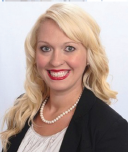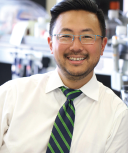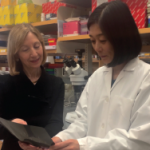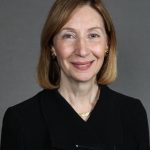Rheumatology Research Foundation Fellow in Training Accepts Appointment at University at Buffalo

Alysia Kwiatkowski, DO, MS
In 2018, Alysia Kwiatkowski, DO, MS, a rheumatology fellow at Rush University Medical Center, Chicago, took the advice of her division director, Joel A. Block, MD, the Willard L. Wood, MD, Professor of Rheumatology, to engage in rheumatology issues at the national level. Dr. Block and another mentor, Sonali Khandelwal, MD, assistant professor in the division of, and associate program director for, the internal medicine training program, “encouraged me, knowing that much of my research is in medical education,” Dr. Kwiatkowski said recently.
After being nominated by Dr. Block, Dr. Kwiatkowski joined the Rheumatology Research Foundation last November as a fellow in training invited guest. The appointment dovetailed with her research in medical education, in which she compares team-based learning with non-interactive or moderately interactive sessions and explores the incorporation of musculoskeletal examination workshops into rheumatology electives.
This fall, Dr. Kwiatkowski will move to the University at Buffalo (UB), New York, where she will be taking on multiple roles. She will combine teaching and clinical work as an assistant professor, and spend a considerable portion of her time working in the Medical Education and Educational Research Institute (MEERI), established by the Jacobs School of Medicine and Biomedical Sciences. There, she will have protected time to continue her research. The move to Buffalo will also be a homecoming for Dr. Kwiatkowski, who was born in the city and did both her undergraduate and master’s work there.
“It’s actually a wonderful time to head back,” she says. The city has “a new children’s hospital (the John R. Oishei Children’s Hospital), the medical campus has been significantly upgraded and [the city] is making an enormous effort to recruit young professionals to the area.” Buffalo is also where she first became attracted to rheumatology. While in college, she worked as a medical assistant to a rheumatologist in private practice and became fascinated with the complexities of the diseases and the opportunity for long-term provider-patient relationships.
“It was rheumatology that drew me to medicine, and not the other way around,” she recalls.
Dr. Kwiatkowski looks forward to her new venture in her hometown, engaging with patients and students, and helping to further the science of medical education.
Alfred Kim Honored with Lupus Leadership Award

Alfred H.J. Kim, MD, PhD
Alfred H.J. Kim, MD, PhD, assistant professor of medicine, assistant professor of pathology and immunology, and co-director of the Lupus Clinic at Washington University (WashU), St. Louis, Mo., has received the 2018–2019 Lupus Leadership Award from the Heartland Chapter of the Lupus Foundation of America (LFA). In his honor, the Heartland Chapter produced a video about his achievements as a clinician.
Dr. Kim’s affiliation with the local chapter of LFA began shortly after he started the Lupus Clinic at WashU, he says. “When I started the clinic, my intentions were to consolidate and improve the delivery of healthcare to our patients, to start translational and clinical research projects related to human lupus at WashU, and to improve our relationship with the local community.”
As part of the latter goal, he joined the Heartland Chapter Board of Directors. The relationship, he says, has been “very synergistic—their current infrastructure for programs, support groups and advocacy have been important for our clinics, [because] we didn’t offer many of those services.”
The clinic currently serves more than 350 patients, two-thirds of whom are African American. There are now seven ongoing clinical and translational research projects addressing some of the most pressing unmet needs in SLE, such as the NIH-funded CASTLE (Complement Activation Signatures in Systemic Lupus Erythematosus) study led by Dr. Kim. He and his colleagues have continued collaborations with LFA, as well as St. Louis University. The efforts have revolved around rewriting curricula for providing skills to support groups, patients and caregivers as they cope with lupus.
Dr. Kim is intrigued with the challenges of teaching the SLE curriculum to medical students. “The complexity of this disease provides incredible richness for investigators in their academic careers, but trying to simplify the message about lupus to trainees without dumbing it down is a challenge for the people teaching it,” he notes.
Dr. Kim was also awarded the 2017 Distinguished Service Teaching Award from Washington University School of Medicine. He credits mentoring from John P. Atkinson, MD, Samuel B. Grant professor of clinical medicine, and Richard D. Brasington Jr., MD, professor of medicine, for giving him support and instrumental encouragement in his own career path.
“Seeing how they describe the disease was fascinating, because many of the same tools they use for students, they also use for patients. This makes sense, because as a teacher you’re trying to distill the information so that others [trainees or patients] can appreciate core principles and then be able to describe it.”
Dr. Kim has been able to reach his patients in this same way, giving them tools to cope with this complex disease. One of his patients, who appears in the commemorative video, put it this way: “Even though I still have lupus, lupus does not have me.”


